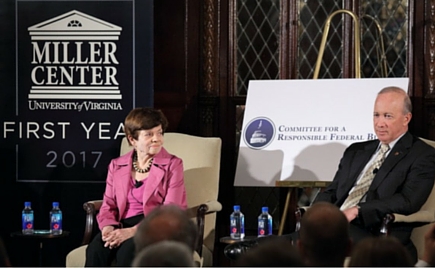Facing fiscal realities—for real
 Photo by Tom Cogill
Photo by Tom Cogill
Immediately upon taking office, the next president must level with the American people about the need to raise revenues and reduce the deficit, yet neither the Republican nor Democratic contenders have signaled a readiness to administer that unpleasant medicine.
That was the lament of experts on federal fiscal policy who spoke April 5 at the 2016 Caplin Conference on America’s Fiscal and Financial Future in Washington, D.C., a joint presentation of the Miller Center’s First Year Project and the Committee for a Responsible Federal Budget.
“Unfortunately, it’s hard to find a candidate for national office who has spoken seriously about the national deficit, the fix we’re in,” said Mitch Daniels, the former Indiana governor and current president of Purdue University who was the director of the Office of Management and Budget under President George W. Bush.
Daniels termed “ridiculous” the recent claim by Republican frontrunner Donald Trump that he can eliminate the nation’s $19 trillion national debt in eight years, adding that “it will help when people stop making lavish promises that can’t be met.”
Economic experts note that fulfilling such a pledge would require cutting the nearly $4 trillion annual budget in half—which still wouldn’t be enough.
“Everyone should understand that we can’t take a meaningful first step toward a responsible future for the next generation that doesn’t include a lot more revenue,” Daniels said. “There’s no other way to squeeze the lemon for more revenue. Recognize that arithmetic reality.”
Added Alice Rivlin, a senior fellow at the Brookings Institution who was the OMB director during the first Bill Clinton administration: “You’ve got a structural long-term deficit looming at you. You have to adjust taxes and entitlement programs and it takes a long time for any changes to take effect. So a fiscally responsible administration should take that on immediately.”
The most important priority, Rivlin added, “is putting the social security system, which all older people depend on, on a firm fiscal foundation, which at the moment it is not.”
Yet such solutions are “really, really hard,” noted Maya MacGuineas, president of the Committee for a Responsible Federal Budget. “No politician likes to talk about them, especially during the campaign.”
Rather than merely avoiding such difficult topics, the current presidential campaign “is filled with absolutely ludicrous discussions when it comes to fiscal policy,” added MacGuineas, whose essay for the First Year project argues for a bipartisan solution to the nation’s fiscal challenges.
Jared Bernstein, senior fellow at the Center for Budget and Policy Priorities and a former economic adviser to Vice President Joseph Biden, elaborated on the theme of his First Year essay, “End magical fiscal thinking,” which urges the next president to confront the reality that taxes and spending must be brought into alignment.
“Try to talk about this theme of magical fiscal thinking, to say to America, ‘I’ve looked at the books, we’re promising this and we’re collecting that. There’s two ways we can solve this, America: We can bring down what we promised or increase what we collect.’”